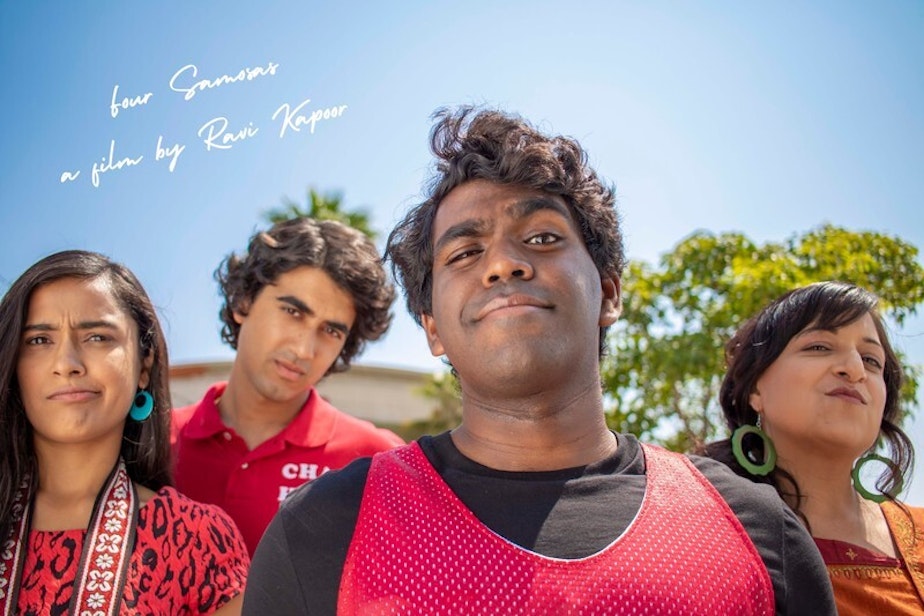Not just more of the same, South Asian filmmakers break out of the mold

This Thursday, the Seattle-based Tasveer South Asian Film Festival is coming to town. It's a festival dedicated to films by and about South Asians.
For many Americans, thinking of South Asian film brings to mind Bollywood, or maybe this year's hit film "RRR." But South Asian Film goes far beyond those borders.
KUOW Community Outreach Coordinator Kamna Shastri has been diving into the festival.
For her, the festival represents the shifting demographics of Western Washington.
"I grew up here in the 1990s and 2000s," Shastri says. "There weren't as many of us back when I was growing up, even some 20, 25 years ago. And that population has just grown exponentially in our area. And then the Tasveer South Asian Film Festival really challenges the way we think about South Asian cinema as not just something about Bollywood, but also it includes so many regional languages."
South Asia includes eight countries: Afghanistan, Bangladesh, Pakistan, India, Sri Lanka, Bhutan, Nepal, Maldives — and dozens of languages. The festival also aims to represent members of the diaspora.
Sponsored
"More and more South Asians are making films, who are living here within North America," says Rita Meher, founder and executive director of the film festival.
"We want to provide all different kinds of perspectives — like a different cross section of intersectional perspectives on different stories and characters. It really gives me a lot of satisfaction and enjoyment when someone comes up to me and says, 'Oh, I had no idea so and so, such a thing happened, or this story existed, or this community existed.'"
Overall, the festival will show films from 17 countries in 15 languages.
Meher says a goal of the festival is to display the diversity of South Asia, and the diaspora.
The festival's opening night film, "Four Samosas," is about the diaspora. The film is set in Artesia, a neighborhood in Los Angeles that's also known as Little India.
Sponsored
"I find myself feeling inspired in that world, in terms of storytelling, and I find myself also being in my comfort zone as well," says Ravi Kapoor, director of "Four Samosas."
"I want to tell those stories, and I feel that they are under told. And there's definitely room for them. There's a massive amount of room for them. And it's best that we tell those stories ourselves rather than waiting for somebody who's not of the community to."
But, "Four Samosas" actor and producer Venk Potula also points out that diasporic films are not about one experience or identity.
"I think that's sort of what's exciting now is to see — other filmmakers also telling their version of of a diaspora story," Potula says. "And I think it's important that we don't define it, and make it that it has to look like this. Because then we can really show people what an experience can be. That's authentic to us without trying to fit any mold."
Kapoor also noted that often, South Asian experiences shown on screen are dictated by larger production companies, which are often not owned or run by other South Asian people.
"What they want to see from us is the same stories," Kapoor says. "They want to see stories about arranged marriages, they want to see stories about how difficult it is to fit in. That's what they've seen, and they think that's what their audience wants to continue to see. And only by having control of the development process, and of the producing process as well, are we able to kind of go, 'Well, hang on, these aren't our only stories.'"
Sponsored
Filmmaker Maya Bastian also dives into the importance of perspective in her Tasveer featured short film, "Tigress."
"What choices would you make if you lived in a war zone?" Bastian asks. "We sit very easily and judge from a distance, these rebel organizations. We judge a lot of things. And I have learned from being in these places that you really can't judge what choices people make."
Bastian is a Tamil Sri Lankan Canadian filmmaker. In "Tigress," a young woman named Trina goes back to Sri Lanka, and comes face to face with the privilege of her life in the West.
"I think questioning your identity and struggling with the privilege that we carry here, knowing that our ancestors did not have those privileges, knowing that they still do not have those privileges in those countries, that is a big, big question that a lot of first generation kids have," Bastian says. "How do you sort of rectify your own privilege with how you move in the world?"
But, like Kapoor and Potula, it's the individual that draws Bastian into a story.
Sponsored
"I think it's the unique experiences that I'm drawn to," Bastian says, "because then that means there's no end to the stories you can tell."
The Tasveer South Asian Film Festival begins Thursday, Nov. 3, and runs through Nov. 20. You can find more information about the festival here.






